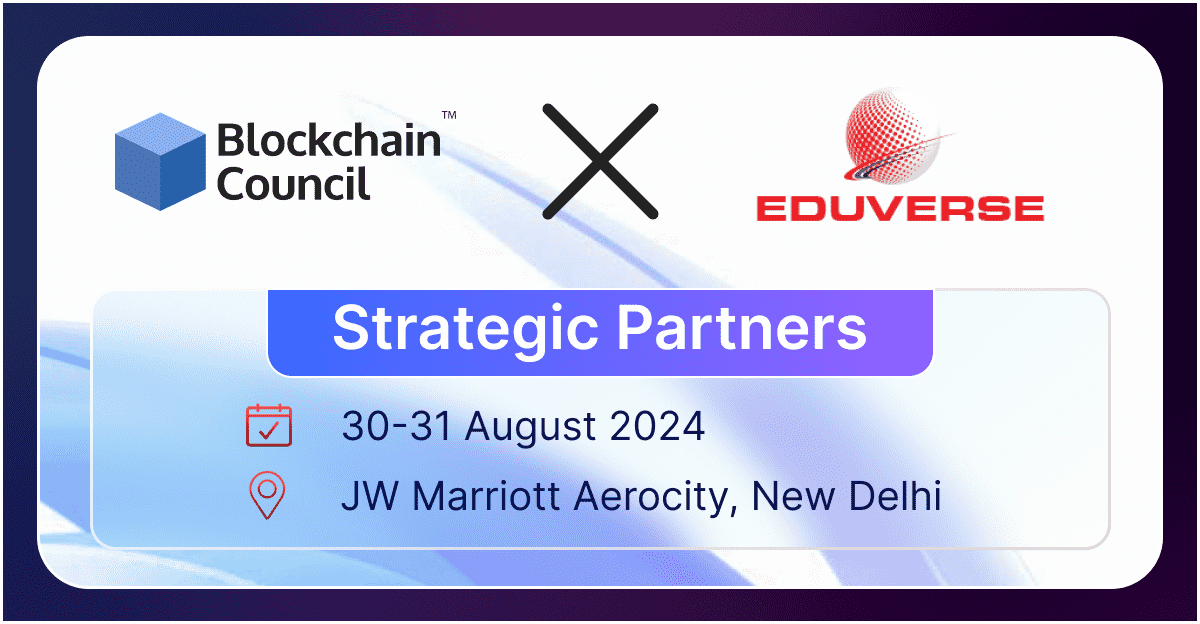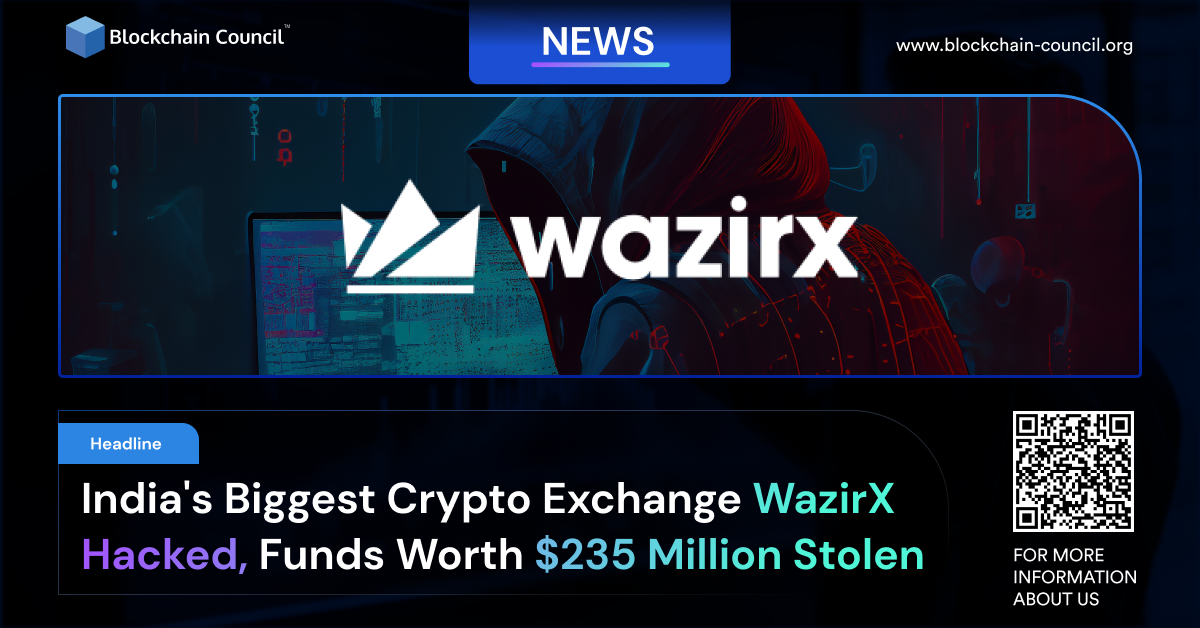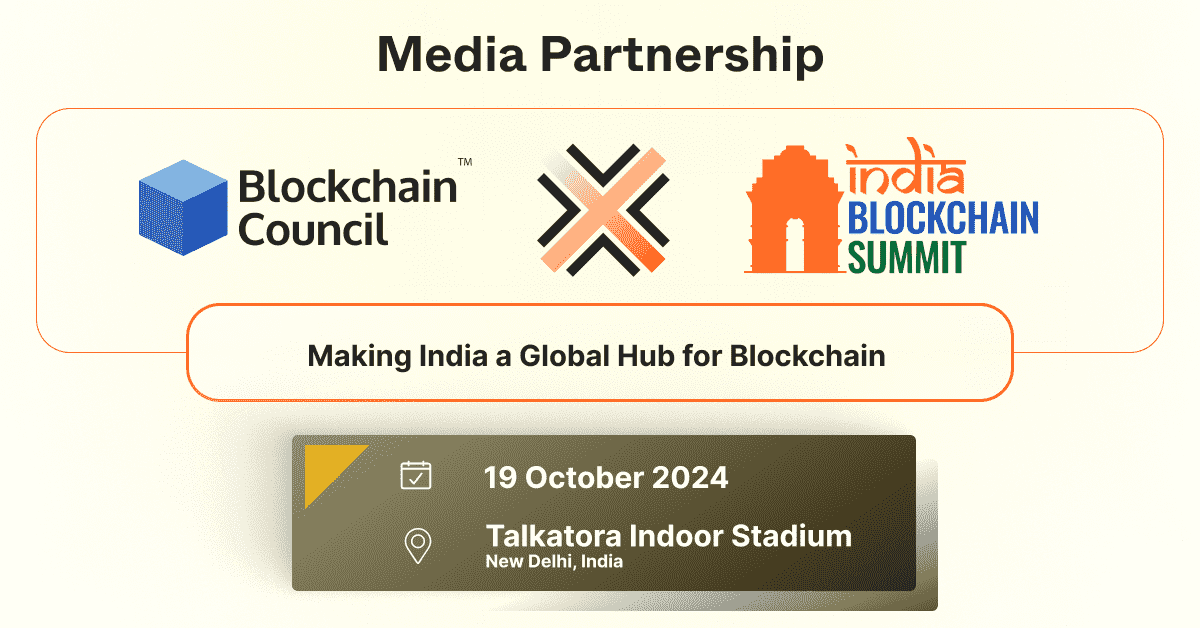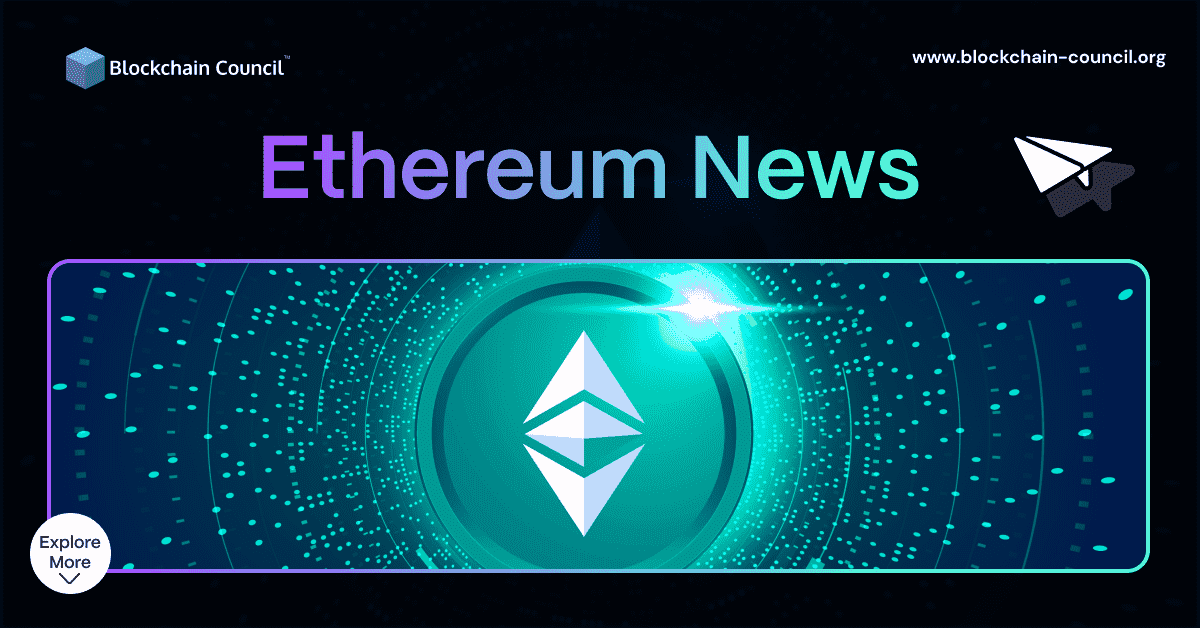
Blockchain Council Announces Strategic Partnership with Eduverse Summit India 2024
Blockchain Council is excited to announce its strategic partnership with the Eduverse Summit India 2024, scheduled to take place on August 30-31, 2024, at the
Home » Understanding Blockchain » How to Become a Blockchain Developer? [UPDATED]

Blockchain technology has become increasingly popular in modern technical infrastructure. Industry leaders and giants like Meta, Google, Microsoft, and Apple are invested heavily in Blockchain development to develop a business model on either Blockchain or other technologies built on the Blockchain platform. And what is common in this development process of every small to big enterprise working in the sector?
The answer is the demand for a Blockchain developer – An individual with technical proficiency and sound experience in working with the decentralized technical architecture of Blockchain and a clear understanding of basics to advanced concepts of this emerging new technology.
These professionals are an important pillar of Blockchain adoption. The recent developments in Blockchain are projecting signs that the current supply and demand ratio for Blockchain developers is yet to increase, and the industry is soon to fall short of active open-source developers to develop Blockchain systems.
If you are someone with a zeal to learn this new-age technology and benefit from this huge requirement balloon in the industry, this article is a perfect guide to learning the most efficient path of becoming a Blockchain developer.
Let’s get started!
A Blockchain developer is a software engineer who builds decentralized applications (DApps) and Blockchain-based solutions. They thoroughly understand Blockchain technology and are proficient in programming languages such as Solidity, Java, Python, or C++. They are responsible for designing, developing, and implementing Blockchain protocols and smart contracts to store and exchange digital assets.
The roles and responsibilities of a Blockchain developer can vary depending on the organization and the project they are working on. Some of the major responsibilities may include:
This involves working on decentralized applications’ design, architecture, and development using Blockchain technology.
Smart contracts are self-executing contracts that are used to automate complex business processes. Blockchain developers are responsible for creating, testing, and deploying smart contracts on the Blockchain network.
Blockchain developers write code in programming languages such as Solidity, Java, Python, or C++. They use these languages to develop Blockchain protocols and DApps.
Testing and debugging are critical aspects of Blockchain development. Blockchain developers test the Blockchain network and DApps to ensure they function as intended.
Blockchain technology is still evolving, and developers must stay up-to-date with the latest trends and technologies. This involves attending conferences, reading research papers, and participating in online forums and communities.
To become a Blockchain developer, one must have a solid computer science, mathematics, and programming foundation. A degree in computer science, mathematics, or a related field is preferred, but it is not always necessary. A Blockchain developer should also understand technical details and concepts like cryptography, distributed systems, and databases. Blockchain developers should possess strong problem-solving skills and attention to detail. They should also have excellent communication skills, as they must work closely with other developers, stakeholders, and end-users. There are two major ways to acquire the right skill set to become a credible Blockchain developer. Let’s look closely at them:
Blockchain technology is rapidly growing, and various degree courses can prepare individuals to become Blockchain developers. The courses vary in level, duration, and focus, but they all aim to equip students with the knowledge and skills to develop Blockchain-based solutions.
Here are some of the degree courses that can help you to become a Blockchain developer:
A degree in computer science is a great foundation for becoming a Blockchain developer. Computer science programs teach students about programming languages, algorithms, data structures, and software engineering. These skills are essential for building Blockchain-based solutions. Students who pursue computer science can specialize in Blockchain technology by taking courses in cryptography, distributed systems, and databases.
Mathematics is another field that can prepare individuals to become Blockchain developers. Mathematics programs teach students about complex systems, probability, statistics, and mathematical modeling. These skills are essential for understanding Blockchain technology’s underlying algorithms and protocols.
Information technology is a degree program that prepares individuals to design and develop technology solutions for businesses. This program teaches students about computer networks, software development, database design, and cybersecurity. These skills are essential for developing Blockchain-based solutions.
A degree in business or finance can also prepare individuals to become Blockchain developers. These programs teach students about financial systems, accounting, economics, and business operations. These skills are essential for understanding the potential use cases for Blockchain technology in the business world.
Some universities now offer degree programs that focus specifically on Blockchain and cryptocurrency. These programs give students a deep understanding of Blockchain technology and its potential use cases. Students in these programs learn about cryptography, decentralized systems, smart contracts, and Blockchain-based applications.
Online certifications are an excellent option for individuals who want to become Blockchain developers but may not have the time or resources to pursue a full degree program. These certifications are shorter and more focused than degree programs and offer a dedicated certification for a specific skill set. Here are some of the benefits of pursuing an online certification to become a Blockchain developer:
Online certifications are generally shorter than degree programs, which makes them less time-consuming. Many online certifications can be completed in weeks or months, depending on the program’s intensity and the student’s availability. This allows individuals to acquire the necessary skills and knowledge needed to become a Blockchain developer in less time.
Online certifications are designed to provide a specific skill set that can be immediately applied to a job or project. For example, some online certifications focus on Blockchain development using specific programming languages, such as Solidity or Java. These certifications offer a dedicated certification for a specific skill set, which can make job candidates more attractive to potential employers.
Online certifications offer flexibility in terms of scheduling and location. Students can complete the coursework at their own pace, which allows them to balance their studies with work and other responsibilities. Additionally, online certifications can be completed from anywhere worldwide, removing the need to relocate or commute to a physical location.
Online certifications are generally more cost-effective than degree programs. Many online certifications offer competitive pricing; some even offer free or low-cost options. This makes it more accessible for individuals who may not have the financial resources to pursue a full degree program.
Some of the popular online certifications for Blockchain development include:
The Certified Blockchain Developer (CBD) certification is offered by the Blockchain Council and is designed to teach students about Blockchain development and its practical applications. The certification program covers various topics, including Blockchain basics, smart contract development, and Blockchain security.
To earn the CBD certification, students must complete the following:
The CBD certification is suitable for individuals who want to understand Blockchain development and its practical applications comprehensively. The certification program provides students with the skills and knowledge to develop Blockchain-based solutions using Solidity and other programming languages.
The Certified Ethereum Developer (CED) certification is designed to teach students about developing decentralized applications (DApps) using the Ethereum Blockchain. The certification program covers various topics, including Ethereum basics, smart contract development, and DApp development.
To earn the CED certification, students must complete the following:
A Blockchain developer is a technical professional with broad technical skills and knowledge required to develop Blockchain-based solutions. Here are some of the key technical skills that a Blockchain developer should possess:
A Blockchain developer should be proficient in programming languages such as Solidity, Java, Python, C++, and Go. Solidity is the most popular programming language for developing smart contracts on the Ethereum Blockchain.
A Blockchain developer should understand how Blockchain technology works, including consensus algorithms, block creation, and block validation.
A Blockchain developer should have experience developing smart contracts using programming languages such as Solidity. Smart contracts are self-executing contracts with the terms of the agreement between the buyer and seller being directly written into lines of code.
A Blockchain developer should have experience developing decentralized applications (DApps) using Blockchain technology. DApps run on a Blockchain network rather than a centralized server.
A Blockchain developer should have a solid understanding of cryptography, including public and private key encryption, digital signatures, and hash functions. These concepts are critical to ensuring the security of Blockchain-based solutions.
A Blockchain developer should have experience working with distributed systems, including the ability to design and implement distributed systems using Blockchain technology.
A Blockchain developer should know Blockchain frameworks such as Ethereum, Hyperledger, and Corda. These frameworks provide pre-built components and libraries to simplify Blockchain development.
A Blockchain developer should have experience with web development technologies such as HTML, CSS, and JavaScript, as many Blockchain-based solutions involve the development of web-based user interfaces.
A Blockchain developer should have experience testing and debugging Blockchain-based solutions, including the ability to identify and resolve issues related to smart contracts and DApps.
Additional Skills for Blockchain Developers
Solid Understanding of Data Structures and Algorithms
Blockchain technology heavily relies on data structures and algorithms to ensure the integrity and security of decentralized systems. As a Blockchain developer, having a solid understanding of these fundamental concepts is paramount.
Data Structures: Familiarity with data structures like linked lists, hash tables, and Merkle trees is vital for efficiently storing and managing data on the Blockchain. These structures enable quick data retrieval, authentication, and verification within a decentralized network.
Algorithms: Knowledge of algorithms such as consensus algorithms (e.g., Proof of Work, Proof of Stake), cryptographic algorithms (e.g., RSA, SHA-256), and encryption algorithms (e.g., AES) is crucial for developing secure and efficient Blockchain solutions. Understanding how these algorithms work underpins the foundation of Blockchain technology.
In the collaborative world of Blockchain development, version control systems are indispensable. Git, a widely used distributed version control system, enables developers to track changes, manage code repositories, and collaborate seamlessly with other team members.
By mastering Git, Blockchain developers can effectively contribute to open-source projects, manage codebase versions, and resolve conflicts. Embracing good Git practices ensures efficient teamwork, code maintainability, and easy integration of changes into Blockchain applications.
Knowledge of Encryption Techniques
The decentralized nature of Blockchain technology relies heavily on encryption techniques. Understanding these concepts is vital for safeguarding data integrity, privacy, and security within Blockchain systems. Encryption algorithms, such as symmetric and asymmetric encryption, are essential for protecting sensitive data on the Blockchain. By applying encryption techniques, Blockchain developers can ensure data confidentiality, prevent unauthorized access, and enable secure communication channels.
Building Blocks of Blockchain Development
1. Creating and Deploying Smart Contracts:
At the heart of many Blockchain applications lies the concept of smart contracts. These self-executing contracts, encoded with predefined rules and conditions, enable transparent and decentralized transactions. To embark on your journey as a Blockchain developer, understanding smart contract development is paramount. Begin by grasping the fundamentals of Solidity, the most widely used programming language for Ethereum-based smart contracts. Learn the syntax, data types, and control structures, and explore the plethora of available tools and frameworks such as Truffle and Remix. Dive into contract design patterns and explore real-world use cases to solidify your understanding. Remember, smart contract development is the cornerstone of Blockchain applications, empowering trust and efficiency in digital ecosystems.
2. Interacting with Blockchain Networks and Nodes:
To harness the true power of Blockchain, you must learn how to interact with Blockchain networks and nodes. Familiarize yourself with the basics of Blockchain architecture, distinguishing between public and private networks. Get acquainted with the various consensus mechanisms such as Proof-of-Work (PoW) and Proof-of-Stake (PoS). Dive deeper into node deployment and configuration, mastering the process of syncing with the Blockchain network. Explore web3.js, a JavaScript library that enables seamless interaction with Blockchain networks, and discover its extensive functionalities, from querying transaction data to executing smart contract functions. By acquiring these skills, you’ll unlock the ability to build decentralized applications that leverage the true potential of Blockchain.
3. Implementing Blockchain Security Measures:
In the realm of Blockchain development, security is of paramount importance. With the potential for significant financial transactions and sensitive data, implementing robust security measures is imperative. Begin by understanding the concept of cryptographic algorithms that underpin Blockchain security. Delve into encryption, digital signatures, and hash functions, grasping their significance in ensuring data integrity and privacy. Explore best practices for secure key management and wallet implementation, mitigating the risk of unauthorized access. Additionally, master the art of auditing smart contracts for vulnerabilities, using tools like MythX and Slither to identify potential exploits. By prioritizing security, you’ll gain the trust of users and stakeholders, cementing your reputation as a proficient Blockchain developer.
4. Testing and Debugging Blockchain Applications:
Building resilient and bug-free Blockchain applications requires a meticulous approach to testing and debugging. Embrace the principles of test-driven development, creating comprehensive test suites that cover all aspects of your application’s functionality. Leverage testing frameworks like Truffle and Ganache to simulate Blockchain environments and ensure seamless integration with your smart contracts. Employ debugging tools such as Remix and Ganache to identify and rectify issues within your code. Emphasize comprehensive unit testing, integration testing, and even end-to-end testing to guarantee a robust and reliable application. By mastering the art of testing and debugging, you’ll demonstrate your commitment to quality and reliability in the Blockchain realm.
Exploring Blockchain Development Frameworks and Platforms
Ethereum
Ethereum stands out as one of the most prominent Blockchain development platforms. It offers a decentralized environment that empowers developers to create smart contracts. These self-executing contracts automate a wide range of tasks, resulting in efficient and transparent operations. Ethereum also boasts a vibrant ecosystem, nurturing popular decentralized applications (dApps) like CryptoKitties and Augur. However, it’s important to note that Ethereum is an evolving platform, and certain security concerns have been raised.
Hyperledger Fabric
Hyperledger Fabric, a modular Blockchain framework designed for enterprises, provides a permissioned platform. This means that only authorized users can participate in the network, ensuring enhanced privacy and control. Its architecture supports scalability and security, making it an ideal choice for applications demanding high performance. Hyperledger Fabric also enables fine-grained customization and compliance with regulations. Nonetheless, due to its complexity, developers may face a learning curve while implementing solutions.
Hyperledger Sawtooth
Hyperledger Sawtooth is another modular Blockchain framework tailored for enterprise usage. Like Hyperledger Fabric, it embraces a permissioned model, offering diverse consensus algorithms such as Proof-of-Elapsed-Time (PoET) and Proof-of-Stake (PoS). These algorithms contribute to scalability and robustness, making Hyperledger Sawtooth suitable for applications handling a substantial number of transactions. However, it’s worth noting that Hyperledger Sawtooth may have a smaller developer community compared to other platforms, potentially impacting the availability of resources and support.
R3 Corda
R3 Corda is a private Blockchain platform specifically designed for financial institutions. It employs a permissioned model with a Byzantine Fault Tolerance (BFT) consensus algorithm, ensuring high levels of confidentiality and integrity. R3 Corda seamlessly integrates with existing systems and emphasizes regulatory compliance. However, as a proprietary platform, it lacks the openness and transparency associated with open-source alternatives.
Evaluating the Advantages and Disadvantages of Different Platforms
Each Blockchain development framework and platform mentioned above offers distinct advantages and disadvantages. Before choosing a platform, carefully consider the requirements of your application.
In addition to selecting the appropriate Blockchain development framework and platform, leveraging the right development tools and frameworks can expedite the deployment process. Consider the following options:
Engaging in open-source Blockchain projects provides a remarkable opportunity to learn and contribute to real-world Blockchain applications. Here’s how you can dive into this enriching experience:
1. Understand the fundamentals:
Before diving into open-source projects, it is essential to grasp the fundamentals of Blockchain technology. Familiarize yourself with concepts like decentralized networks, consensus mechanisms, smart contracts, and cryptographic principles.
2. Explore Blockchain platforms:
Gain exposure to different Blockchain platforms such as Ethereum, Hyperledger, and EOS. Each platform has its own set of features and use cases. Experiment with setting up development environments and deploying smart contracts to gain hands-on experience.
3. Contribute to existing projects:
Browse through popular open-source Blockchain projects on platforms like GitHub. Start by understanding the project’s purpose, codebase, and development guidelines. Contribute by fixing bugs, enhancing functionality, or proposing innovative features. Active participation in open-source projects not only helps you learn but also allows you to showcase your skills to potential employers.
Joining Blockchain Developer Communities and Forums
Joining Blockchain developer communities and forums is an excellent way to connect with like-minded individuals, share knowledge, and stay updated with the latest industry trends. Consider the following steps to make the most of these communities:
1. Identify relevant communities:
Research and identify active Blockchain developer communities and forums. Platforms like Reddit, Stack Exchange, and Telegram host vibrant communities where developers discuss ideas, share experiences, and seek assistance. Participate in discussions, ask questions, and offer your insights to engage with fellow developers.
2. Attend Blockchain meetups and conferences:
Attend local meetups and conferences focused on Blockchain technology. These events provide valuable networking opportunities, allowing you to connect with industry experts and learn from their experiences. Stay updated with event calendars and make it a point to attend gatherings that align with your interests.
3. Collaborate on side projects:
Engage in collaborative side projects with other developers from these communities. By working together, you can explore complex problems, experiment with innovative ideas, and gain valuable insights from different perspectives. Collaborative projects not only enhance your technical skills but also provide opportunities to establish lasting professional connections.
Leveraging Collaborative Tools for Effective Teamwork
In Blockchain development, teamwork plays a vital role in building robust and scalable applications. Leveraging collaborative tools enhances productivity and facilitates seamless coordination. Consider the following tools to streamline your collaborative efforts:
1. Version control systems:
Utilize version control systems like Git to manage code repositories effectively. These systems enable developers to work on the same codebase simultaneously, track changes, and merge modifications seamlessly. Platforms like GitHub and GitLab provide additional features like issue tracking and project management, fostering efficient teamwork.
2. Communication and project management tools:
Employ communication and project management tools like Slack, Trello, or Asana to facilitate effective collaboration within your development team. These tools allow for real-time communication, task tracking, file sharing, and seamless workflow management. Clear and constant communication among team members enhances efficiency and minimizes misunderstandings.
3. Documentation platforms:
Document your code, project specifications, and development processes using platforms like Confluence or Notion. Well-documented projects facilitate knowledge sharing, onboarding new team members, and ensuring smooth transitions during project handovers. Clear documentation contributes to the overall success and maintainability of Blockchain applications.
Advancing Your Blockchain Developer Skill
Staying Updated with the Latest Blockchain Trends and Technologies
To excel as a Blockchain developer, it is crucial to stay abreast of the latest trends and technologies in this rapidly evolving field. By continuously expanding your knowledge, you can position yourself as a valuable asset in the competitive Blockchain industry. Here’s how you can accomplish that:
a. Engage with Blockchain Communities:
Join online forums, social media groups, and communities dedicated to Blockchain development. Active participation in these communities exposes you to diverse perspectives, discussions, and invaluable insights shared by fellow Blockchain enthusiasts and experts.
b. Follow Thought Leaders and Influencers:
Identify influential figures in the Blockchain space and follow their blogs, podcasts, and social media accounts. Thought leaders often provide thought-provoking analyses, cutting-edge research, and updates on emerging trends, empowering you to stay ahead of the curve.
c. Attend Blockchain Conferences and Events:
Make it a priority to attend Blockchain conferences, seminars, and workshops. These events not only offer opportunities to network with industry professionals but also provide a platform to learn about the latest advancements, case studies, and best practices directly from industry leaders.
Latest Blockchain Trends and Technologies
Blockchain technology continues to evolve at a rapid pace, presenting developers with exciting opportunities to expand their skill sets. Let’s explore some of the latest trends and technologies that every aspiring Blockchain developer should be aware of:
a. DeFi (Decentralized Finance):
DeFi has gained tremendous traction in recent years, revolutionizing traditional financial systems by providing decentralized alternatives for lending, borrowing, and trading. Mastering the intricacies of smart contracts and decentralized applications (dApps) within the DeFi ecosystem can significantly enhance your Blockchain development expertise.
b. NFTs (Non-Fungible Tokens):
The rise of NFTs has ushered in a new era of digital ownership and unique digital assets. Understanding the underlying Blockchain standards, such as ERC-721 and ERC-1155, and their integration with different platforms will enable you to create, deploy, and interact with NFTs effectively.
c. Blockchain Scalability Solutions:
As Blockchain adoption expands, scalability becomes a critical challenge. Exploring various scalability solutions, such as layer 2 protocols (e.g., Ethereum’s Layer 2, Plasma, and Optimistic Rollups), sharding, and sidechains, will equip you with the knowledge to develop scalable Blockchain applications.
d. Interoperability and Cross-Chain Solutions:
Blockchain interoperability aims to establish seamless communication and data transfer between different Blockchain networks. Familiarize yourself with protocols like Polkadot, Cosmos, and interoperability standards like the Inter-Blockchain Communication (IBC) protocol to facilitate cross-chain interactions and interoperability.
e. Privacy and Confidentiality in Blockchain:
Addressing privacy concerns within public blockchains is gaining prominence. Delve into privacy-oriented technologies, such as zero-knowledge proofs (ZKPs), ring signatures, and secure multi-party computation (sMPC), to ensure the confidentiality of sensitive data while leveraging the benefits of Blockchain technology.
Why is a portfolio of Blockchain projects important for an aspiring Blockchain Developer?
A portfolio of Blockchain projects is essential for aspiring Blockchain developers because it provides tangible evidence of their skills and abilities to potential employers or clients. It demonstrates that the developer has practical experience working with Blockchain technology and can apply their technical knowledge to real-world problems.
Here are some reasons why a portfolio of Blockchain projects is important for an aspiring Blockchain developer:
A Blockchain project portfolio allows aspiring Blockchain developers to showcase their technical skills and expertise. It provides tangible evidence of their ability to develop Blockchain-based solutions, work with smart contracts, and build DApps.
A portfolio of Blockchain projects demonstrates the developer’s ability to solve real-world problems using Blockchain technology. This is a critical factor that employers look for when hiring Blockchain developers.
A portfolio of Blockchain projects sets new Blockchain developers apart from their peers. It shows they have a real passion for Blockchain technology and are committed to developing their skills and knowledge.
Developing a portfolio of Blockchain projects can help an aspiring Blockchain developer build a network of peers and potential employers. This can lead to valuable networking opportunities, mentorship, and job offers.
Building a portfolio of Blockchain projects provides practical experience working with Blockchain technology. This experience can help fresher Blockchain developers identify their strengths and weaknesses and better understand the technology.
Blockchain technology has potential in other sectors, such as real estate, energy, and logistics. Blockchain technology is revolutionizing many industries, and there are various career opportunities for Blockchain developers in different sectors. Blockchain developers can work on developing Blockchain-based solutions for finance, telecom, social media, gaming, healthcare, supply chain management, and various other industries. The demand for skilled Blockchain developers is expected to grow as the technology continues to evolve and gain adoption in new industries. Check out Blockchain Council’s dedicated Blockchain Developer certifications to learn Blockchain most effectively.

Blockchain Council is excited to announce its strategic partnership with the Eduverse Summit India 2024, scheduled to take place on August 30-31, 2024, at the

Indian crypto exchange WazirX confirmed on Thursday that it had faced a significant security breach. The incident resulted in approximately $235 million in assets being

The Blockchain Council is delighted to announce its media partnership with the highly anticipated India Blockchain Summit 2024. This landmark event, scheduled to take place

JPMorgan Mandates AI Training for Every New Employee JPMorgan Chase is making artificial intelligence (AI) training a mandatory part of the onboarding process for all

Ethereum’s Viral Project Algotech Raises $5.1M Algotech, an Ethereum Blockchain-based algorithmic trading platform, has created a buzz in the cryptocurrency market by raising a staggering
The time it takes to become a Blockchain developer varies depending on one’s prior experience and education level. However, with Blockchain Council’s self-paced online certifications, you can be a Blockchain developer according to your schedule.
Yes, Blockchain developers require coding skills to develop and maintain Blockchain-based applications. Proficiency in programming languages such as Solidity, Java, C++, and Python is important.
There is no specific education requirement to become a Blockchain developer. However, a degree in computer science, software engineering, or a related field can be beneficial. Relevant certifications and experience in programming and development can also be helpful.
The programming languages required to become a Blockchain developer depend on the platform used. Solidity is commonly used for Ethereum Blockchain development, while Java, C++, and Python are used for other Blockchain platforms.
Welcome to the Blockchain Council, a collective of forward-thinking Blockchain and Deep Tech enthusiasts dedicated to advancing research, development, and practical applications of Blockchain, AI, and Web3 technologies. Our mission is to foster a collaborative environment where experts from diverse disciplines share their knowledge and promote varied use cases for a technologically advanced world.
Blockchain Council is a private de-facto organization of experts and enthusiasts championing advancements in Blockchain, AI, and Web3 Technologies. To enhance our community’s learning, we conduct frequent webinars, training sessions, seminars, and events and offer certification programs.
To receive Offers & Newsletters
50,000+ Professionals Certified so far by Blockchain Council

Coupon
expires in
Enroll today in any of the popular certifications curated as per the Industry trends.
